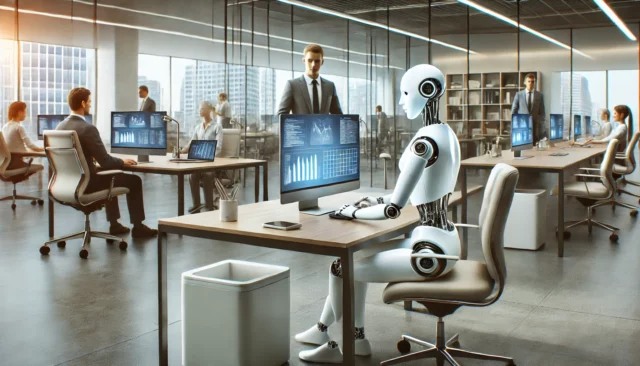The dawn of the AI-enabled intern

On paper, artificial intelligence makes for the perfect intern -- it’s keen to please, happy to do anything thrown its way, and gets on with tasks so efficiently. It’s also prone to making mistakes. And like a human intern, AI tools need training and monitoring rather than being catapulted straight into senior positions -- it is extremely well suited to the repetitive and predictable tasks that we often ask junior staff to handle.
Unlike people, AI works 24/7, never stresses out -- it can complete a vast number of tasks in a short period of time. This makes it ideal for the mundane jobs that people tend to find boring and time-consuming. Take a function such as VAT ledger data analysis, which can contain millions of rows of data -- for a human to correctly analyze every row would not only take an age but would also be mind-numbingly boring. By contrast, AI can examine it in seconds -- think of it as an ‘infinite intern’.
Routine tasks, such as data entry, number crunching and anomaly detection, are equally simple for AI, which can complete them quickly and consistently. This consistency is a key strength; unlike its human equivalents who may be tired, bored or bringing their own cognitive biases to the task, AI works according to algorithms, applying them the same way time after time.
This enables AI to extract useful insights from vast amounts of disparate data that would take humans weeks to compile, analyze and interpret. Predictive analytics powered by AI can then model trends and forecast outcomes based on complicated scenarios built on the raw data.
AI is therefore clearly a great candidate for routine grunt work and mass data analysis as a mere starting point, with the potential to take on more complex tasks with proper supervision. However, as with anything, AI tools are only as good as the training they receive and the data they are fed.
Appropriate oversight
The principle of garbage in, garbage out applies to software in general, and it most certainly applies to AI. If the data fed to an algorithm is not accurate, it will absolutely affect the output negatively. This is when errors happen and where human biases can sneak in, making the results either misleading or flat out wrong. At the same time, AI lacks the ability to understand context in a nuanced way and can miss details that humans spot effortlessly. This sometimes leads AI to hallucinate: make answers up based on misinterpreted data. Only rigorous and constant training can help eradicate such instances.
That means having the right monitoring, evaluation and training in place with a dedicated human overseer tasked with sanity checking the output and addressing any issues.
Working around the clock
Individual employees’ ability to perform effectively and make smart decisions can vary widely depending on a range of factors, including stress, workload, tiredness and even hunger. Even the time of day can have a notable effect on how well we work, according to a recent study. It shows that employees are less productive and more error-prone on afternoons and Fridays; AI on the other hand, suffers no such weaknesses and can work 24/7 with complete consistency.
The future for interns
At this point interns, particularly ones that work in data-hungry industries like finance or tax, might be getting worried. However, by using AI to do all the boring repetitive tasks as the ultimate intern, it will support graduates and assistants instead of replacing them. Rather than spending a significant chunk of their early career focused on mundane but necessary work, human interns will act as gatekeepers -- checking and approving the output already processed by the AI.
This means they can spend more time honing their high value skills and thus accelerate their career development. Rather than wading through endless spreadsheets, human interns can now develop their problem solving, value-added decision-making and strategic planning to make a much greater impact on the business and its clients.
There is no doubt that generative AI will continue to evolve and improve, perhaps to the point where it can handle more complex tasks. However, for now, it is far from capable of imitating the skills of a senior decision maker. Nevertheless, it does bring immense efficiency to data processing and can help attract ambitious young professionals who understand how it will supercharge their own careers.

Russell Gammon is CSO atTax Systems.